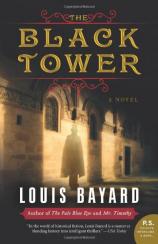The Black Tower
Review
The Black Tower
To open Louis Bayard’s latest novel is to take a step back in time, to the introduction of the world’s first detective. From the cover art promising sinister goings-on to the surprising final chapter, THE BLACK TOWER cannot fail to delight thriller fans. And the old-fashioned touch of chapter titles is a pleasure in and of itself.
The headings break the book into a series of wonderful little stories that all join together into a giant adventure. Each chapter is filled with history and mystery told through the words of one Dr. Hector Carpentier, a man specializing in venereal diseases. Who could be a more unlikely hero? Carpentier is not really cut out for sleuthing but has some very good advice in the opening chapter: Never let your name be found in a dead man’s trousers.
He teams up --- without really meaning to --- with Eugene Francois Vidocq, criminal turned cop, now a famous detective of somewhat shady character and a man with a gigantic reputation and an ego to match. Vidocq has an air about him reminiscent of Sherlock Holmes crossed with Lt. Columbo (of the old TV series).
“Vidocq.”
“Not the scoundrel!”
“Why, he’s not!…He’s the terror of criminals everywhere, he’s – he’s the reason we can sleep with our throats bare.”
“Oh, that’s good! He’s the last man in the world I’d trust with my throat.”
A master of disguise, Vidocq takes Carpentier on a dangerous chase around Paris and the surrounding countryside. The dead man whose trousers the good doctor’s name was lodged in was Chrétien Leblanc. The name rings no bells with Carpentier, but that doesn't stop Vidocq. He pesters Carpentier with an exhaustive barrage of questions until he extracts several revelations. Despite skepticism on Vidocq’s part --- likely stemming from a personal tendency to deception --- Carpentier was not trying to conceal anything; he simply did not understand the significance of facts in his possession.
It is 1881, the early days of the Restoration in France. The political climate is changing, albeit slowly. Loyalties that are even perceived to lean the wrong way can land one in prison, and with only the shakiest of proof necessary. So when someone suggests that the dauphin --- Louis-Charles, Duke of Normandy, son of Marie Antoinette and King Louis XVI --- might still be alive, it is best said in hushed tones. The king’s execution and that of Marie Antoinette, for treason, seems explanation enough for exercising extraordinary caution. Could a hint that the dauphin survived be the reason Leblanc was murdered? If so, why did he have Carpentier’s name in his pants pocket, and why was he seemingly headed to see the doctor?
The official story goes that the dauphin was tossed into a filthy cell in the Temple, a cruel and unforgiving prison, on the fourth floor of the black tower, and that he eventually died there. But with Leblanc’s death, followed by yet another, the possibility that young Louis-Charles somehow escaped starts to look plausible.
Before Vidocq and Carpentier can interview someone who sounds like a reliable source with a wealth of information, the man dies. Vidocq handily arrests one of his assassins, wresting from him the story of how he and his partner were approached for the job, and by whom. Unfortunately, the man knows his employer simply by the moniker “Monsieur.” In France, that is certainly not very specific. Another attempt at proving the truth of the story is foiled!
But Vidocq is nothing if not tenacious, pursuing all leads like a dog hot on the trail and dragging Carpentier along with him. To his amazement, Carpentier turns out to be almost as good a detective as he is a venerologist. Carpentier surprises himself, as well as Vidocq, as he ferrets out clues, follows them up, dissects them and trusts his instincts to expose the truth. But, in the end, can they prove that the young man they have found is Louis-Charles?
Louis Bayard’s MR. TIMOTHY was a rare and refreshing delight in the historical fiction genre, and his PALE BLUE EYE ratcheted him up a notch further on the talent scale. But with THE BLACK TOWER, his amazing skill with words coupled with his firm grasp of history cannot be matched. Reading a Louis Bayard story is fun, informative, whimsical and dark as the forbidding tower he writes about.
Reviewed by Kate Ayers on January 24, 2011





